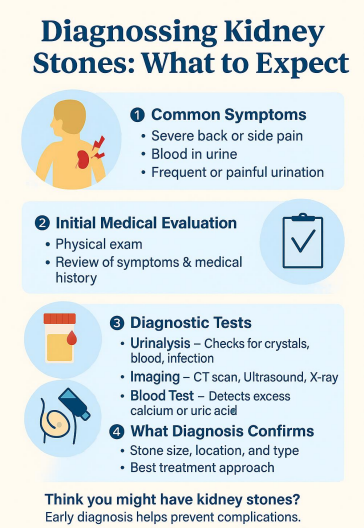
If you’re experiencing severe back pain, blood in your urine, or frequent painful urination, you might be dealing with kidney stones. Early diagnosis is key to preventing complications and getting the right treatment.
Here’s what to expect:
- Common Symptoms:
- Sharp back or side pain
- Blood in the urine
- Frequent or burning urination
- Sharp back or side pain
- Initial Medical Evaluation:
A physical exam and review of your medical history help your provider determine the need for further testing. - Diagnostic Tests:
- Urinalysis: Detects crystals, blood, or infection
- Imaging: CT scan, ultrasound, or X-ray to locate the stone
- Blood Tests: Check for high calcium or uric acid levels
- Urinalysis: Detects crystals, blood, or infection
- What the Diagnosis Confirms:
- Stone size and location
- Stone type (e.g., calcium oxalate stones)
- Best treatment options (medication, lifestyle changes, or surgery)
- Stone size and location
Consider adding a kidney stone prevention supplement like Kidney C.O.P.® if you’re prone to recurrence, especially for calcium oxalate stones.
For more info, check out our blog post on How Calcium Oxalate Stones Form and How to Stop Them.
Filed Under: Kidney Health
